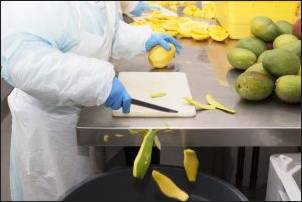By Jean Blish Siers *
 William Shakespeare wrote, What’s in a name? That which we call a rose by any other name would smell as sweet. And yet, when we refer to perfectly edible food as “ugly produce” or “salvage,” it denigrates something that deserves a great deal more respect. That’s why a recent story in The Washington Post caught my eye: Baldor, a company that provides produce and other products to restaurants, hospitals, schools, and other commercial clients in the Northeast and Mid-Atlantic, has revamped its processing system to completely eliminate food waste. And to do so, they created a new word: “SparCs.”
William Shakespeare wrote, What’s in a name? That which we call a rose by any other name would smell as sweet. And yet, when we refer to perfectly edible food as “ugly produce” or “salvage,” it denigrates something that deserves a great deal more respect. That’s why a recent story in The Washington Post caught my eye: Baldor, a company that provides produce and other products to restaurants, hospitals, schools, and other commercial clients in the Northeast and Mid-Atlantic, has revamped its processing system to completely eliminate food waste. And to do so, they created a new word: “SparCs.”
SparCs is scraps spelled backwards (and pronounced like “sparks”), turning around how they look at the food in their system that would normal be tossed — a new word for a new model — and a new way of looking at food waste.
How does it work? According to the article, Carrot skins and tops, strawberry tops, odd-shaped pieces of watermelon and other fruit and vegetable pieces are sold at 30 cents a pound — about half their usual value — to Misfit Juicery, a D.C. company that cold-presses perfectly-edible “ugly” produce into juice. Other vegetable odds-and-ends are sold to Haven’s Kitchen, a New York restaurant and cooking school that uses them for sauces, soups, and broths. Baldor is also experimenting with other creative reuses. McQuillan says the company is dehydrating sparcs and turning them into a dried vegetable blend that he compares to bouillon. Baldor plans to make it available to its clients and retailers by the end of 2017.
Items not fit for human consumption (melon rinds, for instance) go to farms to feed chickens or pigs, or are composted and returned to the soil. Nothing – nothing! – is thrown away.
Baldor has found that the process saves them money. They’re selling parts of the produce that previously would have been thrown away. They no longer have to pay a company to haul away literally tons of produce, and pay a landfill to accept it. So it’s better for their profits and better for the environment.
It’s encouraging to see companies beginning to rework their models to eliminate food waste, and to change how we look at food. We can do this on a much smaller scale in our own kitchens as well, of course. For instance, I regularly save the trimmings off carrots, onions and celery in a bag in the freezer. When I make chicken or vegetable stock, I already have the vegetables washed and ready to toss in the pot! The last slice of bread in a package might be a bit too stale for a sandwich, but it would make great croutons or breadcrumbs. Let’s all go to our refrigerators right now and see what other SparCs we might be able to use for dinner tonight!
* Jean Blish Siers is SoSA’s Charlotte Area Gleaning Coordinator.
MAR
2017

